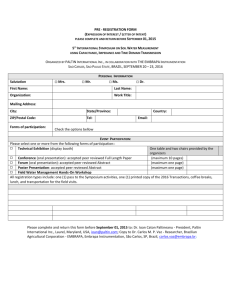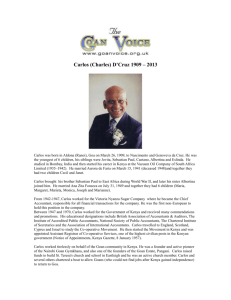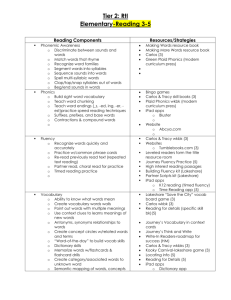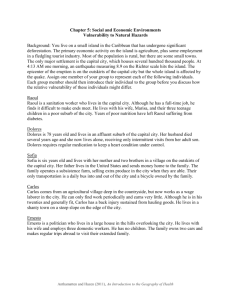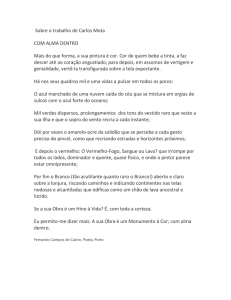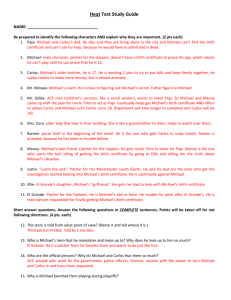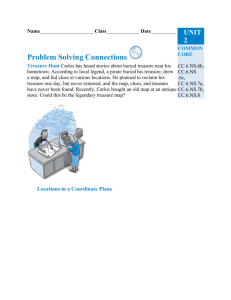THE BANDEIRANTES STONES
advertisement
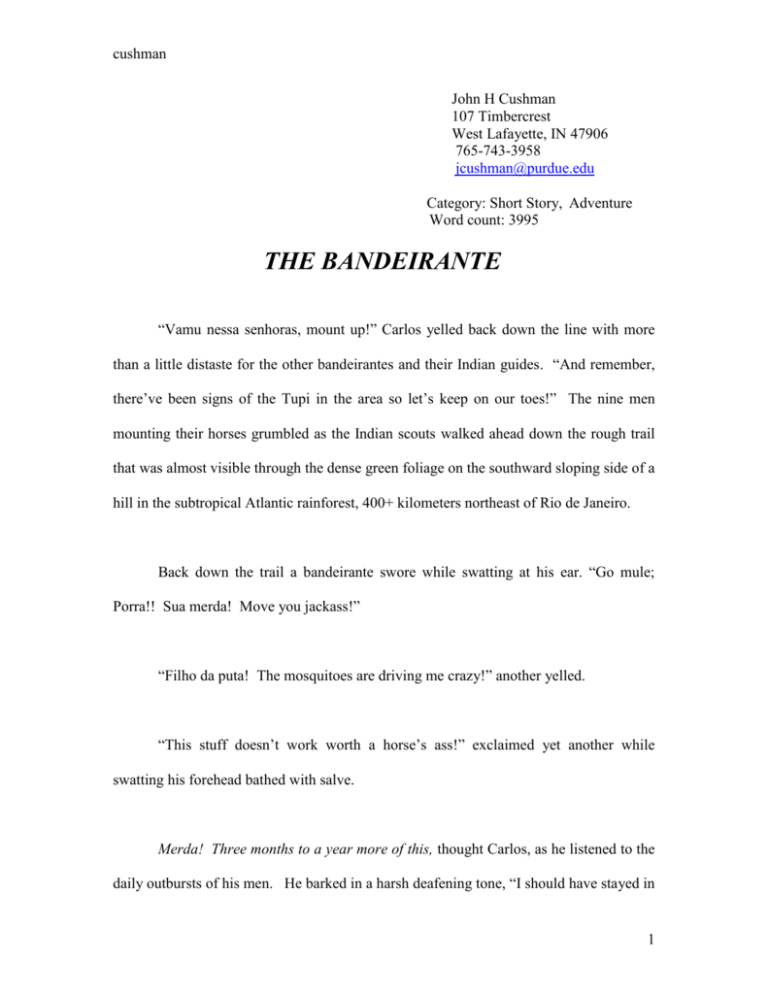
cushman John H Cushman 107 Timbercrest West Lafayette, IN 47906 765-743-3958 jcushman@purdue.edu Category: Short Story, Adventure Word count: 3995 THE BANDEIRANTE “Vamu nessa senhoras, mount up!” Carlos yelled back down the line with more than a little distaste for the other bandeirantes and their Indian guides. “And remember, there’ve been signs of the Tupi in the area so let’s keep on our toes!” The nine men mounting their horses grumbled as the Indian scouts walked ahead down the rough trail that was almost visible through the dense green foliage on the southward sloping side of a hill in the subtropical Atlantic rainforest, 400+ kilometers northeast of Rio de Janeiro. Back down the trail a bandeirante swore while swatting at his ear. “Go mule; Porra!! Sua merda! Move you jackass!” “Filho da puta! The mosquitoes are driving me crazy!” another yelled. “This stuff doesn’t work worth a horse’s ass!” exclaimed yet another while swatting his forehead bathed with salve. Merda! Three months to a year more of this, thought Carlos, as he listened to the daily outbursts of his men. He barked in a harsh deafening tone, “I should have stayed in 1 cushman jail where I had food, the safety of four walls and didn’t have to listen to this constant moaning and groaning of you women! Vamu nessa senhoras, let’s move!” Carlos Roberto de Assis was Portuguese by birth with long black hair and a medium length beard that was graying prematurely for a thirty year old who was a fit 6’2” in the prime of his life. He was born and raised in a small village thirty kilometers inland of Lisbon. His father had banished him from his home at fourteen, so he’d joined the army and grown up fast, but a chip on his shoulder led to his constant brawling and eventually got him unceremoniously discharged. He decided to seek his fortune in the new world and survived a tortuous voyage across the Atlantic to arrive in the small port town of São Paulo, southwest of Rio de Janeiro. Except for the children he sired by several Indian slaves, he lived the next eight years of his life uneventfully, but a year ago he’d found his Tupi wife in a compromising position with a neighbor, and in a fit of rage he shot her and beat him to death with the butt of his pistol. The town of São Paulo sentenced Carlos to only two years and gave him the option to lead an expedition inland in search of Indians to enslave or spend the time in jail. Had his wife been of European ancestry, the machismo ethic of the late 1600’s would have led to a verdict of justifiable homicide, and he’d have been acquitted altogether. The group traveled for twelve hours before making camp beside a small stream in the dense forest. The bandeirantes were soaked from sweat in the sweltering heat and 2 cushman humidity and a white lather could be seen on the horses and mules backs when their saddles and packs were removed. The hoards of mosquitoes and climate were almost unbearable for the bandeirantes, but the Indian scouts seemed oblivious to the elements and pests, and unlike the others in the party, they’d walked all day rather than sit atop a horse. “Merda, another day in this God awful heat and humidity and we’ve nothing to show for it! What’s wrong with the scouts; are they working for us or the natives!?” Carlos angrily asked of the lot. Another bandeirante exclaimed, “Porra! Maybe we should kill a couple as motivation for the others!” Laughter was heard around the cook fire as one got up to piss on a spider he’d seen walking by his boot. “Maybe you’re right; an example might be just the tonic they need!” another burst out. “We could draw and quarter one; there’s nothing like watching a man’s limbs get ripped off by horses to motivate others to do as they’re told!” More laughter was heard around the fire. One of Carlos’ comrades was feeling a little under the weather even before they started imbibing the next morning. He’d awoken with a mild runny nose which rapidly turned into a severe headache with pain behind the eyes, a backache and joint pain. His temperature was significantly elevated and he was sweating more than usual, all signs of 3 cushman dengue fever. Fortunately the disease, which was transmitted by the Aedes mosquito so prevalent in the area, was rarely fatal to healthy men and though he’d basically recover from the main symptoms in about six days, he’d remain tired and depressed for the next few weeks. Carlos was thinking something was wrong with his cohort when he saw how little rum he was consuming and then he noticed the unusual amount of sweat and recognized what the problem was. “Qualé a tau? Sua merda!” he exclaimed as he headed over to the stream to relieve himself. “Sua merda! You’re going to be worthless to me over the next few days!” The scouts returned shortly before dusk to find the bandeirantes passed out and scattered rag-tag around the camp. They set about watering and feeding the horses and mules that’d been tethered and unattended all day and then they washed and prepared a dinner of fruits and a few fish they’d caught in the stream. At sunrise Carlos’ red eyes slowly opened and it seemed to him that someone must be hitting his head with a hammer, but compared to his companion with dengue fever he was in good shape, that soul was in truly exquisite pain aching from his toes to the tips of the hair on his head. Carlos, who’d experienced dengue fever before and knew his comrade would be fine in time, looked at him briefly but had no sympathy whatsoever. His own head felt as if it would explode momentarily, though in his case the pain was from a man-made source. He arose, staggered to the stream bank where he 4 cushman promptly returned everything in his stomach back to nature and then splashed in submerging his head briefly before heading back to camp pulling his long knotted black main behind his ears. When everyone seemed functional, the head scout reported what they’d seen the previous day. They’d found Tupi near the Tripui stream about ten kilometers to the east. He believed they numbered about forty or so adults evenly spilt between male and female and he’d no idea how many children there were. He’d seen no captive Indians so there’d be no bartering for slaves. At dusk, when the vampire bats started rising from their roosts, the bandeirantes shed their European clothes, donned loin skins and painted their bodies black with charred wood taken from the last two night’s fires. Except for one scout left behind with the horses, mules, and dengue-fever stricken bandeirante, they headed out together on foot, following a small stream until it merged with the larger Tripui whose waters they traced to the Indian village. They set the Indian’s canoes adrift, quietly began to reconnoiter the area and developed a plan of ambush for daybreak. There were no domesticated dogs to give warning of danger and the Indians thought no one would be so foolish to travel these woods at night and posted no guards after dusk. The bandeirantes took up their positions and most fell asleep in the early morning hours, but Carlos stayed awake and made the rounds to wake the others shortly before they were to attack at dawn from all sides at once to enhance the confusion and surprise. 5 cushman If all went as planned they wouldn’t have to fire a shot, but as in most battles, things wouldn’t go as planned. They stealthily approached the twenty grass huts where all but one Indian slept. Unbeknownst to Carlos and his men a pregnant woman had gotten up to relieve herself, and one of the bandeirantes came upon her squatting figure quite unexpectedly, seeing her just as she saw him. She let out a scream that rapidly turned to a gurgling sound as he cut her throat from ear to ear. After losing the element of surprise, chaos reined as the bandeirantes rushed the village. Black powder rounds were exploding and arrows and spears were flying; it was bedlam. Fifteen minutes later when the carnage had ended, three bandeirantes lay dead and there were twenty two Indian casualties. One bandeirante had an arrow sticking into his nose and coming out the top of his scull, another had a spear through his chest and the third’s head was who knows where. The Indian dead and wounded were even a more grizzly sight with legs, arms, heads, and torsos everywhere. “Merda! I can’t stand that crying and moaning!” Carlos shouted while laughing as he thought of what they were about to do. He and the others wasted no time after the remainder of the tribe was subdued. The wounded captives were promptly executed by knife as were the elderly and children under the age of ten; they were just too much to handle on the long trip back and of little financial value anyway. As Carlos looked over their bounty, he noted a young male wearing a pouch that seemed rather full so he snapped it off the Indian and found inside a large, brilliant, 6 cushman prismatic, sherry-red crystal, unlike anything he’d seen before. What could it be? He summoned the head scout over to determine if there were more. By grabbing the captive between the legs and applying the right pressure the scout rapidly had him talking; there were many more crystals hidden in one of the huts. It took the scouts about five minutes to bring back the other stones. All told, Carlos had seventy of these crystals, but he’d no clue what they were. He laid the crystals on an animal pelt and pulled the ends together to tie them off, forming a closed bundle which he then ordered a scout to carry back to their camp. All left as they’d come, leaving behind exposed corpses, including those of their fallen comrades. As they walked, Carlos gave the cluster of captured women a careful once over to see which he’d bed that night. Naturally as the group’s leader, he’d have first choice each night until they reached São Paulo. The journey back to the coast was long and arduous; no one had found a passage across the mountains to Rio which was far closer than São Paulo. One more bandeirante would die on the journey from gangrene that originated in tissue damaged by a snake bite obtained when squatting over a log. They were lucky if they’d make ten miles per day through the impenetrable forest on a trail that was almost wide enough for a horse. The dense green canopy gave the band the feeling they were traveling near nightfall, even in the midst of a hot sunny day. Without Indians as guides they most likely wouldn’t make it back at all. The mosquitoes with their dengue virus, the never ending rain, the snakes and spiders with their venom, the desire of the captives to escape and the heat and humidity made their journey treacherous, long and depressing. The only thing that kept up the bandeirantes spirits was their nightly rum and orgies. 7 cushman Upon arriving in São Paulo, the slaves were herded into a walled courtyard where they’d rest on the dirt until auctioned the following day. Their prison had an elevated auctioneer’s stand in its center and to one side was a massive wooden trough of water. At dawn they were stripped of their small articles of clothing and taken one at a time to the trough where they were systematically washed by the auctioneer’s slaves while the town folk, including children, gathered to look over the naked bounty. Periodically a potential buyer would give one a thorough once-over and examine teeth, feet and, if female other parts of her body. Carlos headed to the goldsmith’s with one newly acquired female slave in tow that he’d decided to keep for his next wife. He would’ve preferred to have a woman of European ancestry, but there were few European women in Brazil, and female children of European decent were often sent to convents to keep them from marrying below their status to men such as him. Because he suspected the crystals were of significant value, Carlos had waited until most in town were at the auction, and he’d prearranged for the town’s goldsmith to be in during the event. He entered the goldsmith’s office trailed by his slave who carried the stones in the animal skin they’d been wrapped in months earlier. He had her set them on the table, then he slowly untied the bundle and the 70 crystals rolled out in front of the goldsmith whose jaw dropped as he moved forward inquisitively to study them in detail. “Well, what are they?” Carlos asked. “What are they worth?” 8 cushman The goldsmith stood there for a few moments; he’d never seen such beautiful crystals. He said they were incredible and must surely be worth a fortune, but he’d no idea what they were or what they were worth. With a look of disgust on his face, Carlos rewrapped the stones and left with his slave as rapidly as they’d come. “Sua merda! Filho da puta!! Now what?” he swore just before exiting the door. Carlos Roberto de Assis decided he’d use some of his bounty for a trip to Portugal and take his slave-woman for comfort on the dangerous voyage, along with the sherry-red crystals he wanted examined by the crown. They headed up the coast by horse to Angra dos Reis where he booked passage for himself and cargo on a ship that would set sail in early September. He’d arrived in Angra a week before his ship was to depart and spent most of that time hanging around the two local taverns drinking and growing more anxious about the upcoming voyage. His routine while in Angra was quite simple; get up around noon, have some bread and cheese, hit one of the taverns, drink until ten or so, and then take his woman. While in the pub that smelled of rum, sweat and mold, he’d tell to anyone who’d listen, wild half-truths about his expeditions inland in search of slaves. Most at the tavern just thought him to be a braggart settler, but that was about to change. 9 cushman Two days before he was to sail for Lisbon, a fight broke out a few feet from where he sat with rum in hand. One patron pulled a knife, stabbed another and proceeded to walk past Carlos on his way out the door. Carlos’ slave was sitting in front of the tavern when the stranger grabbed her and yanked her away. He heard her scream, calmly arose from his seat and walked after the stranger who was dragging his woman. When he caught up, he pulled his flint-lock pistol from his belt, cocked the hammer and placed it squarely against the back of the man’s neck. “You have until the count of três to let my woman go; um.” The man sneered. “Dois.” There was a defining CRACK-BANG as if lightning had hit the tavern. Carlos had pulled the trigger; the ball had left the muzzle, passed through the skin at the base of the man’s neck next to his spine and went straight through his brain to the roof of his skull, where it blasted bone, brain and hair up into the sky. A gentle red mist gradually settled on Carlos’ face and hair. He licked his lips, placed his pistol back in his belt, grabbed his saber and removed it from its sheaf. He raised it high above his head with both hands and rapidly brought it down upon his victim, severing the dead man’s head from his body. He picked the head up by its remaining hair, turned it so that the deceased man’s face met his, spit on it and said, “Filho da puta! No man takes a possession of Carlos Roberto de Assis and lives.” Then he dispassionately tossed it into the watering trough nearby. He turned to face the dozen or so pub patrons who’d come out to see the action, his vacant black eyes rapidly moving from man to man looking for a challenge, but 10 cushman there’d be no challengers, not even the local constable, who’d been in the pub and come out to witness the entire event. While staring at the onlookers, Carlos gently reached down for his slave’s wrist, helped her to her feet and headed back to the boarding house for his daily exercise while the mob in front of the tavern stood frozen in space, unable to move in shock of the gruesome event they’d all witnessed. To a man they’d heard of the cruelty and savagery of the bandeirante’, but none had witnessed it until that moment and none would soon forget. At noon the next day Carlos entered the pub, this time with slave in hand. He took a seat near the door with his back toward the wall, motioned for his woman to sit next to him and flagged the barmaid who came over to where they sat and looked with disgust upon the Tupi Indian. He said, “Dois runs por favor.” “No Indians,” she responded while snickering at the Tupi. Carlos looked at her briefly with his dispassionate eyes, pulled his pistol from his belt and pointed it squarely at her nose. “You have until the count of três; um.” She screamed and ran in panic, dropping her tray of glasses as she flew up the stairs to the loft. When the glasses settled there was a chilling hush in the tavern as Carlos gun came around to point at the bartender. 11 cushman “We’ll have dois runs; um.” The bartender had seen how Carlos dispatched the patron the day before and he’d no desire to see the same happen to him. He quickly poured two, brought them to their table and said there’d be no charge. All the while the constable who’d been watching the action remained motionless at the bar, for he knew Carlos was leaving in the morning and he’d no desire to lose his life over an Indian in a tavern. As Carlos and his woman began to drink, the noise level came up and shortly thereafter the barmaid came out of hiding. She’d serve Carlos and his companion rums the rest of the afternoon. The day finally came and hung-over Carlos arrived at the ship with slave in tow and the crystals tied in a bundle, except the largest which now hung from his belt in the pouch he’d taken from the Indian months before. Though he didn’t want to reveal the crystals to anyone on board, he was forced to show them to a representative of the crown to be recorded in the bill of lading, and since no one knew what they were, their description was recorded in great detail. After finishing with the magistrate, Carlos headed aboard and as he walked off the gang plank was told to surrender his arms. Following a few protests he handed over his pistol and saber, but he kept the knife that was hidden in his boot, just in case. The captain directed the first mate to show them their quarters below deck, which consisted of nothing but a single hammock for him and the deck floor immediately below for her. There was also a piece of hanging canvas to separate them from the crew, though sounds would remain undamped. 12 cushman The smell above decks was that of saltwater and rotting fish, while below it was of mold, aging wood and a slight odor of stale vomit. There was also the smell of various foods, sweaty men who rarely bathed and of course that ever present odor of the urineshit bucket in the corner. Flies were present on some of the hanging food stuffs and Carlos dreaded the thought of eating crawling things with his meals, but he knew that’d be the case. They left port on schedule with favorable winds, heading north-east along the central coast of Brazil. Just before passing Rio the waves oddly shifted to attack the ship from the starboard, even while the wind remained astern. As the day progressed the waves on the starboard continued to grow, and though no one realized it as darkness approached that evening, a massive storm was building over the horizon. The captain first noticed something was amiss when the wind abruptly changed and tried to push them inward toward the coast, but his crew’s skillful use of the lateen sail and rudder kept them true. Carlos hardly noticed the subtle change in weather until the wind began to build as it tried ever harder to push them inward. He was unconcerned and headed below deck to spend the evening in the company of his slave, but she was of little comfort as the small ship began to roll violently on the ever growing swells, and it wasn’t long before both were heaving their stomach’s contents everywhere. The entire crew, except those manning the bilge, was on deck working the sails and rudder while the pair sat below. 13 cushman Sometime around midnight there was deafening sequence of crashes above deck that were easily heard over the roaring of the storm. Several sailors unbattaned the hatch and rushed down to fetch equipment from below decks, and as they did, Carlos took advantage of the opening and with slave in hand headed up top to observe the cause of the commotion. As they climbed out against the stream of water pouring down the steps into the hold, the wind drove the rain and sea spray with such force it felt as if they were stung by thousands of bees. To stay the stream going into the hold, they closed, but didn’t batten the hatch. It was when he saw the tops of both the main and the mizzen shattered about the deck with rigging tangled everywhere and sailors yelling incoherently over the waves crashing against the hull and the screaming of the winds, that Carlos knew they were in dire straights. Just as he turned to yell something into his slave’s ear, a mountain-like wave crashed over the deck, washing them both into the sea. He called to his woman, but to no avail, as the darkness obstructed his vision and the noise of the storm drowned his voice. Only when the sky lit from a flash of lightening would a silhouette of the ship intermittently appear and within a short while he’d lost any sign of the vessel. Carlos had no idea where he was along the coast or how far he was from shore; he was completely at the mercy of the sea, the storm and the darkness. The usually unshakable man was so engulfed with fear that his ability to reason was impaired; he was working on survival instinct. The swells were from 30 to 40 feet, trough to peak, and he seemed to handle these reasonably well. It was when they broke that he really had 14 cushman problems and this happened more frequently as he was washed ever inward. One towering wave lifted him up forty feet and then curled in upon itself, sending Carlos rolling hand over foot thirty feet beneath the surface. To regain his orientation under the water that was pitch, he cupped his hand over his mouth and blew out a short puff of air, and when he felt the bubble hit his hand below his lips he knew he was upside down, so he reoriented himself and headed for the surface. By the time he came up for air, his lungs were set to implode. Three hours of this and he was ready to give up and let the sea take his body, along with the crystal in the pouch that remained attached to his waste. 15
